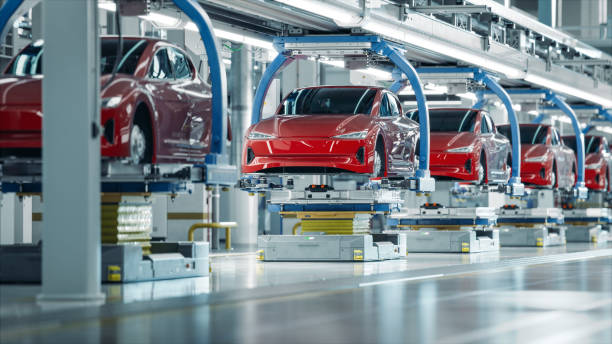
ERP in Automotive: Driving Efficiency Across the Supply Chain
Keywords: ERP in automotive, automotive ERP systems, vehicle manufacturing software, auto supply chain ERP, vendor coordination tools
Introduction: ERP as the Engine Behind the Automotive Industry
The automotive industry is one of the most complex and competitive sectors on the planet. It’s driven by tight margins, global supply chains, just-in-time (JIT) production models, and strict compliance requirements.
What keeps it all moving in sync? ERP systems.
From sourcing parts and managing production lines to coordinating Tier 1–3 suppliers and tracking global logistics, Enterprise Resource Planning (ERP) software is the digital engine powering modern automotive operations.
In an era of electric vehicles, autonomous tech, and supply chain volatility, ERP helps automotive manufacturers and suppliers accelerate production, maintain quality, and adapt in real time.
Why ERP Is Critical in Automotive Manufacturing
Every vehicle includes thousands of parts from hundreds of vendors, often built and assembled across continents. ERP systems help make that manageable by creating a centralized, integrated environment for planning, executing, and improving operations.
✅ Global Supply Chain Visibility
ERP gives automotive firms real-time insight into supplier performance, inbound shipments, and potential disruptions across geographies and product lines.
✅ Production Line Synchronization
Automotive ERP systems coordinate manufacturing execution (MES) with material availability, capacity, and demand forecasting to keep assembly lines running efficiently.
✅ Vendor Collaboration
Through supplier portals and automated workflows, ERP enables just-in-time coordination with Tier 1, Tier 2, and Tier 3 suppliers minimizing inventory costs while maximizing uptime.
✅ Compliance and Quality Assurance
ERP tracks every component back to its source and supports compliance with ISO/TS 16949, IATF 16949, OEM specs, and regional safety regulations.
✅ Logistics & Distribution Management
From outbound logistics to aftermarket parts tracking, ERP connects production with shipping networks and dealer systems ensuring on-time delivery and customer satisfaction.
Key ERP Features for Automotive Enterprises
- Production planning and scheduling
- BOM and version control
- Just-in-time and lean manufacturing support
- EDI (Electronic Data Interchange) integration for supplier communication
- Real-time inventory and warehouse management
- VIN (Vehicle Identification Number) tracking and serialization
- Recall management and defect tracking
- Demand forecasting and sales planning
Industry Trends Driving ERP in Automotive
EV & Battery Supply Chain Integration
Electric vehicle manufacturing demands specialized ERP capabilities to manage battery components, lithium supply chains, and high-voltage safety requirements.
Smart Factory & IoT Integration
ERP is being integrated with IoT-enabled machines, robotics, and MES platforms to deliver predictive maintenance, downtime tracking, and OEE improvements.
Global Disruption Risk Management
ERP systems now incorporate scenario modeling and supplier risk scoring to help automotive firms navigate global disruptions from chip shortages to geopolitical tensions.
Cloud ERP for Scalability
Cloud-based ERP platforms allow OEMs and suppliers to scale operations globally, onboard plants faster, and enable remote access across teams.
Automotive ERP in Action
-
OEMs use ERP to coordinate global production facilities, manage component recalls, and drive consistent quality across model lines.
-
Tier 1 suppliers use ERP to respond to JIT orders, ensure compliance with OEM scorecards, and manage traceability for high-performance components.
- EV startups use cloud ERP to rapidly scale operations, integrate supply chains, and adapt to new compliance requirements.
Why ERP Success Drives Automotive Success
Without ERP, production halts. Costs rise. Suppliers miss delivery windows. OEMs miss deadlines.
With a well-implemented ERP system, automotive companies gain:
- Reduced inventory costs and leaner operations
- Real-time insight into every part, vendor, and shipment
- Higher supplier performance and fewer line stoppages
- End-to-end traceability for faster recalls and audits
“In the automotive world, ERP isn’t just back-office tech... it’s what keeps the wheels of the business turning.”
Need ERP guidance tailored to your automotive operations?
→ Join The Community
Final Thought
ERP is no longer just a manufacturing tool in the automotive industry it’s a strategic asset. It connects people, processes, plants, and partners into a unified system that can adapt to disruption, scale with demand, and fuel innovation.
From Detroit to Stuttgart to Shanghai, ERP is what keeps today’s auto industry in motion.
